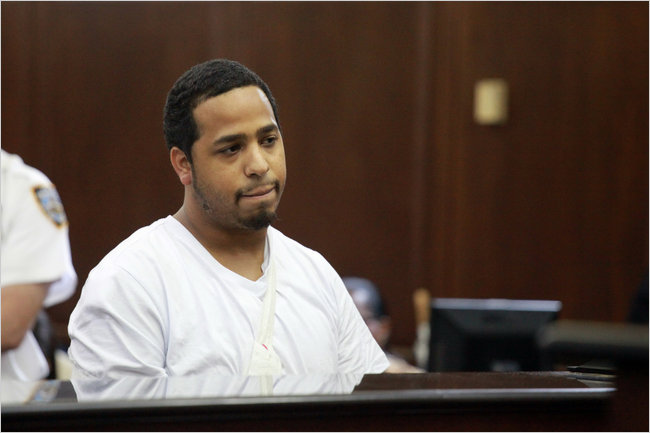NYC Jury Doesn’t Indict Latino Man in Police Shooting
/
Weak NYC Prosecutors also Decline to File Crminal Charges for Officers in Harlem Shooting [MORE]
From [HERE] A special grand jury in Manhattan has declined to indict a man at the center of a chaotic police-shooting case in Harlem last summer in which police officers who were breaking up a block party ended up firing 46 bullets, several of them striking the man.
After a Manhattan prosecutor announced the grand jury’s decision in court on Wednesday, a judge ordered that the man, Angel Alvarez, be released immediately, ending his six months in custody. The judge’s words were immediately met with a burst of emotion from the man’s friends and family in the courtroom gallery.
Mr. Alvarez, 24, was arrested last August after getting into a fight with another man, Luis Soto, in Harlem. The police accused Mr. Alvarez of shooting at them as they converged on the fight. Four officers fired a total of 46 rounds, leaving Mr. Alvarez with 23 gunshot wounds. Mr. Soto was killed; ballistic tests indicated that the fatal bullet was probably fired by the police.
Whether prosecutors will bring charges against the police officers who fired their weapons remains an open question. A spokeswoman for the Manhattan district attorney’s office declined to comment, but indications were that the same special grand jury that decided Mr. Alvarez’s fate also would weigh charges against the police.
The grand jury’s decision not to indict Mr. Alvarez seemed to provide some vindication for the story that his lawyers had been telling since the shooting: that Mr. Soto pulled the gun on Mr. Alvarez, and that their client wrested it from him in self-defense but never fired at the officers.
“I thought I never was going to come home, to tell you the truth,” an elated Mr. Alvarez said as he left State Supreme Court in Manhattan, mobbed by an emotional pack of family and friends.
Mr. Alvarez, wearing a gray hooded sweatshirt and blue jeans, displayed a wide grin as the courtroom doors swung shut behind him. One of his lawyers, Zachary H. Johnson, hugged him and said, “You’re free, buddy.”
Stuffed in Mr. Alvarez’s pants pocket was a mystery novel, “One Step Behind,” by the Swedish author Henning Mankell. Mr. Alvarez said he got the book from a friend he made while on Rikers Island: Nicholas Brooks, who is accused of killing a fashion designer in the SoHo House.
Mr. Alvarez seemed stunned as he spoke outside of the courtroom, embracing his 3-year-old son, Angel Jr.
“It was stressful being incarcerated,” he said. “That was the problem — me not being with my family.”
Mr. Alvarez’s lawyers would not allow him to say much about what happened the night of the shooting. But he said he never lost consciousness even as he was shot and that he did not find out how many times he had been hit until two days later.
“I was in real pain, I know that,” he said.
Dayan Perez, Mr. Alvarez’s sister, who was a fixture in the courtroom for her brother’s hearings, said she was “so overwhelmed right now,” as she walked out with her brother.
But, she added, “we were 100 percent sure this was happening.”
Later, in a written statement sent via text message, Ms. Perez, 25, expressed her condolences for Mr. Soto’s family. She also called her brother’s survival a miracle.
Usually, in cases of police-involved shootings, the officers do not speak to prosecutors while investigators determine whether their actions were justified.
In Mr. Alvarez’s case, the prosecution needed the officers’ testimony to determine whether Mr. Alvarez committed a crime. Typically, the law gives prosecutors about a week to reach an indictment, or else the defendant must be released.
But because the officers would not talk to prosecutors while their own actions were being questioned, prosecutors had to take unusual steps to buy time while they determined what, if any, criminal charges were appropriate.
Prosecutors asked for a rarely used preliminary hearing, in which they presented evidence in court to show that there was reasonable cause to believe that Mr. Alvarez committed a crime. A judge ruled in the prosecution’s favor in that case, giving it 45 more days to reach an indictment.
But prosecutors still needed more time, and Mr. Alvarez’s lawyers agreed to allow their client to stay behind bars while prosecutors convened a special grand jury that was to review all of the circumstances surrounding the shooting, including the conduct of Mr. Alvarez and the police.






























































































































































































































































































